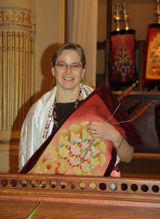Four years after my daughter did.
No, this isn’t one of those “I’m my own Grampa” riddles, even though it may sound that way. It’s the story of how I became a midlife Bat Mitzvah at the age of 53, four years after my daughter went through the ritual at the more common age of 13.
Bat Mitzvah translates from the Hebrew as “daughter of the commandment.” It’s the female equivalent of a Bar Mitzvah, the coming-of-age ceremony for Jewish boys.
Traditionally, Bar Mitzvah ceremonies were limited to boys because Orthodox Judaism prohibits women from reading aloud from the Torah. But over the past 40 years, the Bat Mitzvah has become a common life-cycle event in mainstream American Judaism.
And today, a growing number of Jewish women opt to become a Bat Mitzvah as an adult to make up for the opportunity they missed as a teen.
In my case, I never became a Bat Mitzvah as a teen because my parents weren’t religious. We didn’t belong to a synagogue; I didn’t attend Hebrew School; the idea of a Bat Mitzvah ceremony never even came up for discussion. But over the years I developed a very strong Jewish identity. I lived on a kibbutz after high school, spent time in Jerusalem in my 20s, married my husband under a chuppah (Jewish wedding canopy), and joined a large, active synagogue where our daughter Becca attended religious school.
Over time, I thought occasionally about becoming an adult Bat Mitzvah. I watched with curiosity as my daughter spent a year learning to chant the Bible in Hebrew and writing a sermon about her Torah portion. I took care of all the parental logistics that surrounded her Bat Mitzvah service – invitations, catered lunch, flowers for the synagogue, kids’ party with a DJ, and so on.
But I never did anything about becoming a Bat Mitzvah myself. When Becca was little, I barely had time to sleep, let alone learn to chant Hebrew. As she got closer to 13, I didn’t want to upstage her own moment of achievement.
Then, about a year and a half ago… things shifted.
My daughter had become a fiercely independent high school student. And I was thrust into an unexpected career transition, taking a buyout from my downsizing newspaper. Suddenly I had both more time and less security.
In her teens, my daughter was starting to figure out what she wanted to do with her life.
In my 50s, I suddenly had to figure out what to do with my life too.
So a midlife Bat Mitzvah felt not only feasible but appropriate.
Fast forward 15 months: I beefed up my rusty Hebrew, learned to chant Torah, learned to lead a service, wrote my speech. I enjoyed a series of informal study sessions with my rabbi on topics ranging from Jewish concepts of God to who wrote the Bible.
On Feb. 26, I led my Bat Mitzvah service before a loving, supportive room of about 120 congregants and friends. I chanted, spoke, received a blessing from the rabbi. I felt I had finally earned my tallit, the fringed shawl that Jews have worn to pray for the past 2,000 years.
Along the way, I gained a deeper appreciation of what my daughter and her 13-year-old peers go through – the challenges not just of chanting in a foreign language, but of doing so in a huge room, under stained glass windows, knowing that 60 generations of Jews have done this before you.
But I also realized how different the experience is when you’re 53 rather than 13.
For her it was following a predetermined path, like moving from 7th to 8th grade, while for me, it was deliberately creating my own path. She spent a lot of time anticipating her party (boys! D.J.! chocolate fountain!), while I wanted as little fuss and hoopla as possible. Despite our temple’s efforts to promote lifelong learning, Becca felt “done” with religious education after her Bat Mitzvah, while I was thrilled when the rabbi said I could keep studying with him afterwards.
There was also a sense of mortality that I don’t think she had. Standing there on the dais, I couldn’t help thinking of the prior generations of my family – my grandparents, mother, uncles, aunt who were no longer with us. As much as a 13-year-old feels part of a long tradition, I suspect that age and loss and memory make that sense of tradition even deeper.
Finally, there was one less profound difference. A girl becomes a woman in the eyes of Judaism around the same time she becomes a woman biologically — the onset of puberty.
I, meanwhile, “became a woman” on the far side of menopause!
So my Bat Mitzvah ceremony conveyed an extra layer of meaning. Like a traditional teen Bat Mitzvah, it was a statement of my personal commitment to Judaism.
But as a midlife Bat Mitzvah, it also made a broader statement – that age and biology don’t limit what we can make of ourselves.
Our bodies change. Our children grow up. Our careers may dip and dive and take unforeseen turns. But we can always reinvent ourselves, claim new identities, try new things.
And, sometimes, our children can even be our role models in this.
Ilana DeBare is a writer and novelist in Oakland, Calif. who had her daughter Becca at age 36. She was a co-founder of the Julia Morgan School for Girls, an all-girl middle school in Oakland, and is author of “Where Girls Come First: The Rise, Fall and Surprising Revival of Girls’ Schools” (Tarcher/Penguin, 2004). You can read more about her Bat Mitzvah and other midlife observations on her blog at http://midlifebatmitzvah.wordpress.com.

